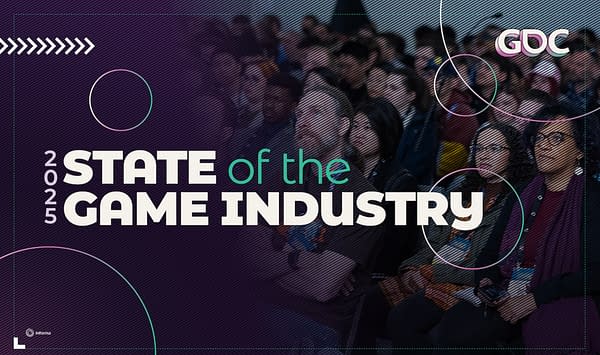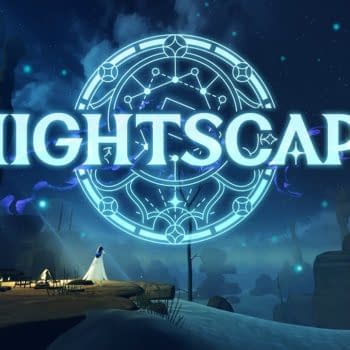Posted in: Games, GDC, Indie Games, Video Games | Tagged: Game Developers Conference
GDC Releases 2025 "State Of The Industry" Results
The Game Developers Conference organizers have released their annual "State of the Industry" results after surveying thousands
Article Summary
- Layoffs impact 11% in gaming, with Narrative roles hit hardest, 58% worried about future cuts.
- Generative AI's gaming impact worries 30%, with older devs more likely to use it.
- PC dominates development at 80%, driven by interest in Steam Deck, browsers gain traction.
- 56% of devs self-fund games, top choice despite challenges in finding financial backing.
Organizers for the Game Developers Conference (GDC) have released their annual "State of the Industry" results ahead of their own convention. Every year, the group sends out a survey to thousands of people involved with the gaming industry at multiple levels, even us, to ask several questions across multiple topics and gauge where things stand in people's minds. Below are the major talking points of the results they released, and you can read the full report on their website.

GDC's 2025 State Of the Industry
Layoffs Continue To Ripple Through The Industry
According to this year's survey, 11% of developers reported being laid off in the past year. Roles in the Narrative field saw the most impact, with 19% of respondents. Business and Finance saw the least reported layoffs, impacting only 6% of respondents. 41% have reported feeling the impact of these layoffs, with 29% observing their direct colleagues being let go and 18% witnessing developers on other teams being let go. 4% reported being laid off due to their studios being closed down. When asked about what reason developers were given for these layoffs, 22% were told it was due to restructuring, 18% cited declining revenues and 15% were due to market or industry shifts. Interestingly, 19% were not given a reason for the layoffs they observed.
When asked about how concerned they are about future layoffs, 58% expressed some level of concern for their job security. Also of note, the number of developers who were not concerned about layoffs decreased by 5% this year, with 30% reporting no concerns.
Developers Are Ever Hesitant About Generative AI
30% of respondents reported that they believe that generative AI is having a negative impact on the games industry, which is a 12% increase from last year. Developers pointed to intellectual property theft, energy consumption, a decrease in quality from AI-generated content, potential biases within AI programs and regulation issues as the main factors behind their discontent with the technology. The majority of developers surveyed (52%) work for companies that have implemented generative AI and one-third (36%) personally use them. Respondents within Business and Finance Roles in companies were most likely to use Artificial intelligence tools (51%), followed by Production and Team Leadership (41%) and Community, Marketing and PR (39%). When the usage of AI was corroborated with the survey respondent's age, it turns out that older developers are more likely to use generative AI than younger ones. 47% percent of developers over the age of 55 listed that they do use these tools whereas only 28% of developers between 18-34 incorporate them into their work.
PC Continues To Be The Platform Of Choice
Last year, 66% of developers reported that they were working on games for PC and this year that number has climbed up to 80%. While the reason for this is unclear, it could be at least partially attributed to the rising popularity for Valve's Steam Deck. While the Steam Deck wasn't specifically listed as an option for developers to list as a platform they're developing games for, of the respondents who chose the 'Other' option, 44% of them listed the Steam Deck as a platform they're interested in.
Interestingly, web browser games are also climbing in popularity, as 16% of developers noted that they're working on releases for web browsers (compared to 10% last year and 11% the year before). This marks the most interest game studios have in browser games across the past decade. In terms of console development, Sony's PlayStation family continues to lead over Xbox, with 38% developing content for the PlayStation 5 and 34% working on games for the Xbox Series X|S. On the flipside, 13% of developers are creating games with the aim to release them on Xbox Game Pass whereas 9% are doing the same for PlayStation Plus. Mobile game development has also increased 5% over last year – with 29% of respondents developing games for Android and 28% developing for iOS.
One-Third of AAA Devs Are Working On Live Service Games
One in every three AAA developers surveyed (33%) noted that they are working on a live-service title. Across the entire survey base, 16% are currently working on a live-service game, and while 13% noted they are interested in developing live service games, 41% expressed that they were not interested at all. Developer opinions of the value of live service games largely vary. On the positive side, developers recognized the financial and community-building benefits of the strategy whereas those who expressed concern with declining player interest, creative stagnation, predatory practices, microtransactions and the risk of burnout. One of the biggest concerns surrounding live-service gaming was market oversaturation, with many developers noting how hard it is to build a sustainable player base.
Most Games Are Financed Through Self-Funding
More than half (56%) of survey respondents reported that they have put their own money into funding the creation of their game. That's nearly double the next most option of project-based or publishing deals, which 28% noted was where their funding had come from. Those who reported that they had utilized self-funding appear to be a good option, as 89% of respondents listed it as being at least somewhat successful for them.
Co-development contracts have observed the highest rate of satisfaction, with one-third (37%) calling the method "very successful." Accelerators were seen as the least viable option, with 43% calling the option "not successful at all." This was followed by Venture Capital at 32% and crowdfunding at 31%. Based on just the data, financially, things seem to be going okay in the gaming industry. However, the developers themselves tell a different story. When asked about the challenges in providing or securing funding nowadays, the response from developers was overwhelmingly negative, frustrated or exhausted. The most cited issues were time, market instability, lack of industry experience or connections, discrimination, creative conflicts and too much competition.
Climate Change Impacts A Notable Number of Developers
In 2024, the impacts of climate change continued to be felt across the gaming industry, with 16% of developers saying they or their company have been impacted by natural disasters. 76% said they haven't been impacted whereas 8% opted for the didn't know option. When asked to specify what natural disasters they or their company faced, 73% of responde










